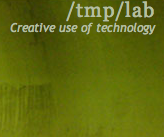Difference between revisions of "Interactive lasers"
From Tmplab
Samneurohack (talk | contribs) (→Hardware) |
Samneurohack (talk | contribs) |
||
| Line 1: | Line 1: | ||
| + | WIKI IN PROGRESS | ||
| + | |||
== Goals == | == Goals == | ||
Revision as of 16:02, 1 January 2015
WIKI IN PROGRESS
Goals
Different levels of complexity are possible. Commercial lasers uses ilda files/connections to draw whatever you want, but you can build your own, see hardware section.
- The very fast and easy plan is to switch ilda scenes according to some inputs. You can use already made ilda files (see download section) in a SDcard plugged inside the laser fixture and use DMX protocol to switch. DMX usb cards are cheap, usually we use enttec ones. DMX controlled lasers are cheaper than
- If the plan is too draw live, it depends on the laser fixture DIY or commercial. Lot of possibilities depending on the number of colors, from using an arduino, a 5.1 USB soundcard upt to use commercially (opensource) cards using the standarts ilda connect ports.
Hardware
Obviously there is DIY Lasers and commercial ones and there is a bunch of cards integrating some DACs to talk to the laser fixture.
A great forum for bootstrap your project is laser freak that comes in different langages.
We play with two different setups :
- a green DIY laser made at la Blackboxe with a lasershark USB DAC card.
- an ilda RGB commercial laser for clubs with an Etherdream USB DAC card. Obviously is much more expensive but has some great advantage : the ether dream is directly tcp/IP controlled, so you can imagine very cool projects with very easy setup and of course the programming langage you prefer.
